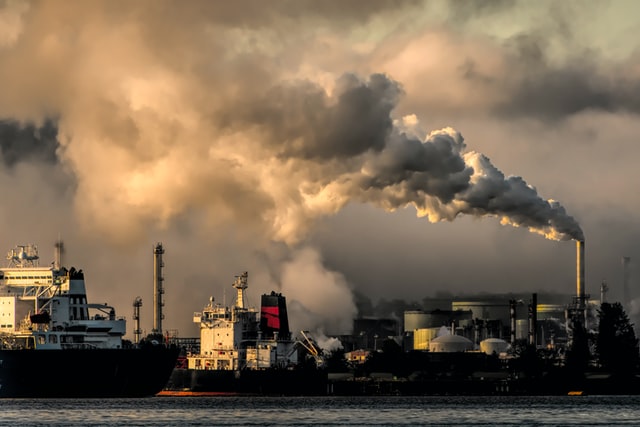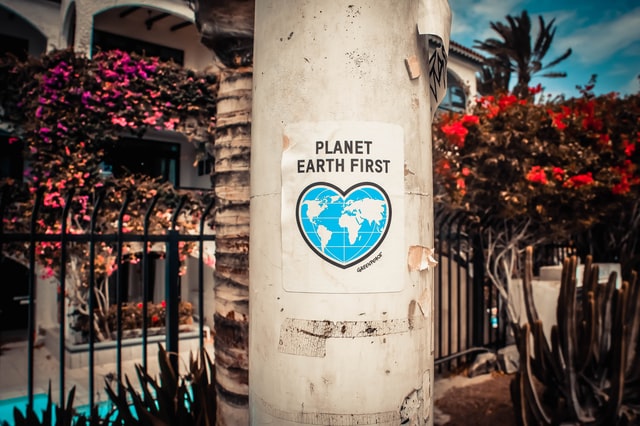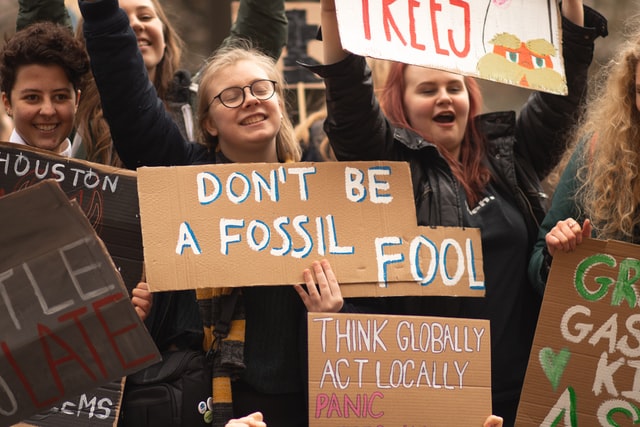As the COP26 climate summit is underway in Glasgow and amid a growing number of climate activist groups fixated on the ad industry, it’s time for agency leaders to pin down where they stand on sustainability. Agencies’ positions on sustainability are already affecting new business—and will continue to in the decades to come. Let’s take a look at how this hot-button topic will shape agencies.

While controversy currently centers on fossil fuels, that's not where it will end
The sustainability of all products and services is subject to the judgment of the masses, with a trickle-down impact on brands and agencies. Traditionally regulated categories like opiates, tobacco, alcohol, gambling, firearms, and more recently, junk food may soon have more company, and not just from fossil fuel companies.
Presently, industries that depend on fossil fuels (like automotive, aviation, and fast fashion) have been subject to scrutiny alongside energy companies. Outside of fossil fuels, paper towels are one example of a product that’s recently come under scrutiny for lack of sustainability. Plastic products, and specifically straws, are another example. Even digital assets and platforms like NFTs and Ethereum are being called out for their high carbon footprint. More will follow.
There will be a greater distinction between agencies that care and those that don’t
Going forward, it will be difficult for agencies to avoid declaring their stance on sustainability. Consumers and agency employees will continue to press for accountability, making it impossible for agencies to take credit for sustainability practices when their client roster and work product say otherwise. Agencies will need to reconfirm their values and stand behind them accordingly.
Transparency will be forced on brands and their agencies by internal parties and external activist organizations determined to “out” agencies for working with controversial clients. This “outing” will be much more damaging to agencies that have presented themselves as sustainable while working with non-sustainable clients behind the scenes. Agencies that are honest and transparent about what they are doing and why have less opportunity to be harmed.
Most agencies may serve purpose and change, but some will serve other ends.
Earlier this year, two former Philip Morris executives launched Mach9, an agency catering exclusively to clients in highly regulated industries like tobacco, pharma, gambling, alcohol, and cannabis. Opinions and politics aside, this was a smart business move on their part—and we expect to see more agencies following suit. Not only have they put a clear stake in the ground, but they have spread their risk by specializing in multiple industries.
The more that other agencies lean into “do good,” sustainable, purpose-driven missions, the greater the opportunity will be for agencies like Mach9 that specialize in business others are hesitant to touch.
The current industry conditions may lead to more extreme differences between agencies. Some will dig into being purpose-driven, inspiring change for the greater good, and be willing to stand on their principles. Others will care less about political correctness and higher purpose and will stand for the freedom to do business with whomever they want for their own reasons. Each type of agency will attract like-minded employees and clients.

“Do good” agencies may struggle to do good
Campaign’s recent survey of 31 agencies (representing 18,500 employees) found nearly 80% have set a goal of reaching net-zero carbon emissions by 2030, with 87% of those expecting it is “likely” or “highly likely” they will reach it. However, agencies that have calculated their years to net-zero carbon impact may be in for a rude awakening as they face pressure to factor in the impact of their creative campaigns and the brands they work with, significantly changing their anticipated trajectory.
Even agencies fully committed to doing good will find there aren't always simple answers when evaluating current and prospective clients against agency values. It may seem an easy, clear-cut decision to reject all non-sustainable, high-carbon clients outright and be done with it, but the decision is complicated by the degree to which fossil fuels are embedded in every aspect of modern life.
“We had a big debate around do you just boycott whole industries, and then we realized if you were going to do that, you’d basically boycott all of them.” — Ben Essen, chief strategy officer, Iris (in Campaign)
Alison Pepper, 4A’s evp of government relations, has warned that accounting for the full impact of every product and service an agency touches can become a slippery slope. She says, “It assumes that so much that we use from oil isn’t in everything. As an agency, if you decide to go down that route, you need to think about what else you might be asked to cut ties with down the road.”
While this concern is warranted, it may be less so for simply accounting for impact than for aspiring to cut ties with anything that has a negative environmental impact. To minimize our negative impact, we must first understand how we are contributing to it.
Boycott the “bad guys” or help them “be better”?
Outright rejection of fossil fuel companies and other high-carbon clients may be counterproductive to the cause of improving sustainability. The reality is that even if 85% of agencies shun all new business from fossil fuel clients (for either principle or appearances), there will still be other agencies eager to take their money. It’s unlikely that the mass rejection by agencies will, by itself, inspire fossil fuel companies to change.
According to one school of thought, if agencies aren’t working with these clients, they can’t help them evolve and push for positive change. As a result, some agencies (like Iris) are taking a more nuanced approach to evaluating potential clients, considering various factors like risk, intention, and potential for impact (Campaign).
As Ben Essen of Iris has said, “it’s OK to be close to the problem, as long as you are working to tackle it.” He also observes that “net-zero is a numbers game, so the greatest opportunities for decarbonization are with high carbon clients” (Campaign). He’s not alone in his thinking.
Nathan Young recently told The Drum that his new division at Deloitte Digital, Ethos, “won’t be taking the high road.” Cautioning agencies against “setting themselves up as moral arbiters,” Young says the worse a company’s track record, the greater “the opportunity for change.”
“Some of the companies who have historically had a more negative impact, there’s more opportunity for change. Those are the ones we should be working with if we want to make a material impact on the world.” — Nathan Young, head of strategy, Ethos (in The Drum)
Of course, as perfectly sensible as this all sounds, the cynical view on this thinking is that it offers a convenient “out” for agencies looking to walk the line between presenting as pro-sustainability while also keeping fossil fuel clients on the roster.
This approach could be a road to success when agencies’ initial assessments about impact and intention prove accurate. On the other hand, for those whose initial assessments prove wrong, it could end badly—especially if agencies don’t disentangle themselves from those relationships quickly. But any agency that thinks there won’t be people checking its receipts is fooling itself.

Whatever agencies do on fossil fuels and sustainability will affect their ability to attract and retain talent
87% of agencies surveyed by Campaign said it would be “significantly” or “slightly” harder to recruit and retain staff by 2030 if they had not made serious progress on their sustainability efforts. But there’s no need to think ahead eight years when sustainability is already affecting agencies’ ability to attract and retain talent right now.
People are increasingly comfortable parting ways with their agency employers for just about any reason, including a disconnect with their personal values. And, according to a 2021 Pew Research report, climate change and sustainability are top priorities for the majority of respondents across generations.
Prospective employees are considering agencies’ client rosters, their values, and the social impact of their work. They aren’t buying lip service and what’s stated on the agency’s website. Instead, they expect agencies’ actions to be consistent with their stated values and will hold them accountable for it.
It would be incorrect to say that agencies who do business with fossil fuel companies will not have access to talent. Of course, they will. But they will have access to a different pool of talent, and it will probably be smaller. Additionally, as creatives gravitate to like-minded organizations, it will further the dichotomy between types of agencies.
Your agency’s stance on fossil fuels will impact its ability to attract and retain new business—and it’s happening now
The current public shaming of agencies who work with fossil fuel companies has been compared to the “tobacco wars” of the ‘80s and ‘90s. The comparison is imperfect, but it illustrates the potential impact on agency new business.
Over time, tobacco became a dirty word. Nobody wanted to work with tobacco—or the agencies that worked with tobacco. And if they did, they weren’t bragging about it. That evolution was slow, but we’re in different times, and the new business impact of having fossil fuel clients on your agency’s roster is already apparent.
Companies like NatWest Group, an Ad Net Zero supporter currently auditing its ad agencies and suppliers, are opting out of business with partners that don’t further their sustainability goals. NatWest’s CMO, Margaret Jobling, told Campaign, “I think increasingly what you’ll see is that [agencies’ sustainability plans] will be a differentiator for which agencies get business or don’t get business.”
Not only will agencies be limited by brands who opt out of doing business with them because of their sustainability practices and client roster, but they will also be limited by the business they opt-out of in service to their values. 20% of agencies surveyed by Campaign said they are already turning down work from prospective clients who are not working in an environmentally sustainable way. Another 60% said they would do so in the future.
Parting thoughts
Every agency will be affected by controversies and concerns over fossil fuels, carbon footprints, and sustainability. Agency leaders would be wise to tackle this head-on rather than waiting passively for impact. Identifying or reconfirming your agency's position on these issues is critical to maintaining control over your agency's identity, reputation, and new business opportunities—now and in the coming decades.
Read more:
- 5 Things To Consider Before Working With Regulated Or Controversial Brands
- What Do Agencies Need To Know About ESG & Helping Brands Be Better?
- How Culture Impacts Agency New Business
- Where Purpose, Brand Performance, and New Business Intersect
- How Brands Nail or #Fail Brand Purpose, with Max Lenderman
Image credits: Photo by Callum Shaw on Unsplash; Photo by Photo Boards on Unsplash; Photo by Chris LeBoutillier on Unsplash



